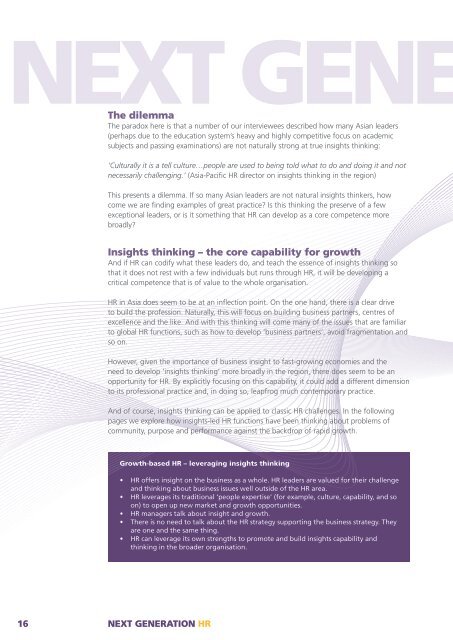NEXT GENERATION HR - CIPD
NEXT GENERATION HR - CIPD
NEXT GENERATION HR - CIPD
You also want an ePaper? Increase the reach of your titles
YUMPU automatically turns print PDFs into web optimized ePapers that Google loves.
<strong>NEXT</strong> GENE<br />
The dilemma<br />
The paradox here is that a number of our interviewees described how many Asian leaders<br />
(perhaps due to the education system’s heavy and highly competitive focus on academic<br />
subjects and passing examinations) are not naturally strong at true insights thinking:<br />
‘Culturally it is a tell culture…people are used to being told what to do and doing it and not<br />
necessarily challenging.’ (Asia-Pacific <strong>HR</strong> director on insights thinking in the region)<br />
This presents a dilemma. If so many Asian leaders are not natural insights thinkers, how<br />
come we are finding examples of great practice? Is this thinking the preserve of a few<br />
exceptional leaders, or is it something that <strong>HR</strong> can develop as a core competence more<br />
broadly?<br />
Insights thinking – the core capability for growth<br />
And if <strong>HR</strong> can codify what these leaders do, and teach the essence of insights thinking so<br />
that it does not rest with a few individuals but runs through <strong>HR</strong>, it will be developing a<br />
critical competence that is of value to the whole organisation.<br />
<strong>HR</strong> in Asia does seem to be at an inflection point. On the one hand, there is a clear drive<br />
to build the profession. Naturally, this will focus on building business partners, centres of<br />
excellence and the like. And with this thinking will come many of the issues that are familiar<br />
to global <strong>HR</strong> functions, such as how to develop ‘business partners’, avoid fragmentation and<br />
so on.<br />
However, given the importance of business insight to fast-growing economies and the<br />
need to develop ‘insights thinking’ more broadly in the region, there does seem to be an<br />
opportunity for <strong>HR</strong>. By explicitly focusing on this capability, it could add a different dimension<br />
to its professional practice and, in doing so, leapfrog much contemporary practice.<br />
And of course, insights thinking can be applied to classic <strong>HR</strong> challenges. In the following<br />
pages we explore how insights-led <strong>HR</strong> functions have been thinking about problems of<br />
community, purpose and performance against the backdrop of rapid growth.<br />
Growth-based <strong>HR</strong> – leveraging insights thinking<br />
• <strong>HR</strong> offers insight on the business as a whole. <strong>HR</strong> leaders are valued for their challenge<br />
and thinking about business issues well outside of the <strong>HR</strong> area.<br />
• <strong>HR</strong> leverages its traditional ‘people expertise’ (for example, culture, capability, and so<br />
on) to open up new market and growth opportunities.<br />
• <strong>HR</strong> managers talk about insight and growth.<br />
• There is no need to talk about the <strong>HR</strong> strategy supporting the business strategy. They<br />
are one and the same thing.<br />
• <strong>HR</strong> can leverage its own strengths to promote and build insights capability and<br />
thinking in the broader organisation.<br />
16<br />
<strong>NEXT</strong> <strong>GENERATION</strong> <strong>HR</strong>

















